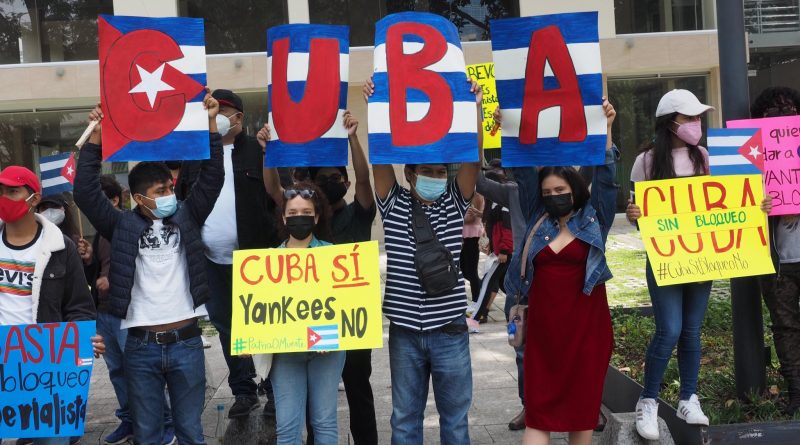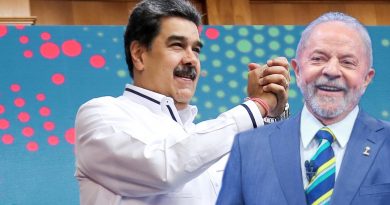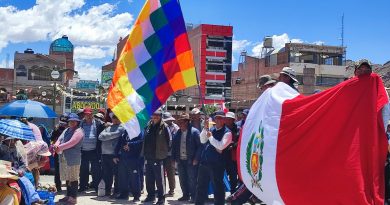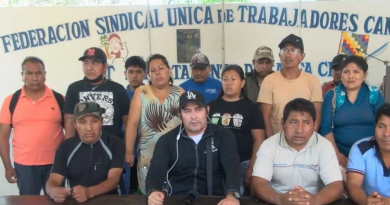The Defense of the Cuban Revolution is a Struggle Against Fascism
Both Republican and Democrat administrations are willing to work with far-right actors as part of the US’ unrelenting effort to extinguish the Cuban Revolution and its example.
By: José Luis Granados Ceja (@GranadosCeja)
Mexico City, Mexico—Among the first groups which turned out to support the demonstrations in Miami against the Cuban Revolution were the far-right Proud Boys. In Mexico City, sympathizers of the right-wing PAN—a party whose founders had links with naziism— went to the Cuban Embassy where they assaulted embassy staff and hurled racist and homophobic comments.
From assassination attempts to the bombing of passenger planes, the opponents of the Cuban Revolution have resorted to the most vile of methods to try to topple the revolutionary government in Cuba. The link between fascism and gusanos has long been established.
Meanwhile, the Cuban Revolution has been defended by the internationalist left since its triumph over a US-backed dictatorship in 1959.
More recently, after counter-revolutionaries tried to use the protests that broke out in Cuba on July 11 to promote regime change, supporters of the Cuban Revolution were also quick to mobilize, organizing demonstrations against US intervention and reiterated calls to end the blockade.
While US President Joe Biden was imposing even more unilateral sanctions on the country, solidarity activists were organizing shipments of much-needed medical supplies. In a full-page letter published in the New York Times, groups such as The People’s Forum and the ANSWER Coalition called on Biden to desist from maintaining the same policies that Donald Trump implemented toward Cuba and instead to end the blockade.
Today, as Cuba commemorates its Day of National Rebellion, the bond between Cuba and its Latin American and Caribbean neighbors has grown only stronger.
Mexican President Andrés Manuel López Obrador even said Cuba should be considered the “Heritage of Humanity” due to its example of resistance and the defense of its sovereignty in the face of imperialist aggression by the US.
As voices in the US call for an explicit military intervention in the Caribbean country, these acts of solidarity have gone a long way in proving that Cuba is not left alone in its struggle against the counter revolution and fascist allies.
However, the fight to defend the Cuban Revolution is rarely framed in terms of being an anti-fascist struggle. In reality, the defense of the Cuban Revolution is absolutely a fight against fascism and its ideology of death.
As history Professor Tyler Shipley explains, fascism can be “hard to pin down ideologically because it behaves differently at different stages” but ultimately the one thing that defines fascism is anti-communism.
“At its heart, fascism is a reaction against the left – what every fascist movement shares is a hatred of those they perceive as the communist left who are trying to change society to the advantage of marginalized classes of people,” Shipley told Kawsachun News.
In Mexico City, for weeks communists have stationed themselves in front of the Cuban Embassy to protect it from counter-revolutionaries who have regularly tried to attack the embassy and its staff.
In Miami, as gusanos prepared to embark on a “flotilla” that would position itself just outside Cuba, a Youtuber known as Alain Paparazzi Cubano warned that “something” could happen if Cuba tried to stop a boat from making an incursion into Cuban waters.
This sort of deliberate provocation is not a new tactic for Cuban counter-revolutionaries. In the mid 1990’s, as Cuba and the US were in the midst of negotiations to normalize relations, a group known as “Brothers to the Rescue” engaged in deliberately provocative acts, illegally flying into Cuban airspace and were said to have plans of engaging in violent actions inside Cuba.
Fidel Castro, then President, insisted the United States do more to stop these illegal flights, with the country issuing a series of diplomatic notes that warned that Cuba was willing to use force to stop these provocations.
Fidel received assurances from President Bill Clinton’s envoy Bill Richardson that the illegal incursions into Cuban airspace would stop. They did not. Left with no choice, on February 24, 1996, the Cuban Air Force shot down two aircraft operated by “Brothers to the Rescue” and killed all four of the crew.
The provocations by Cuban gusanos succeeded in prompting an international incident. The downing of the planes derailed negotiations between Havana and Washington. Clinton instead used the incident to strengthen the US blockade. The White House, which had up until that point opposed the Helms-Burton Act that codified the blockade into law, began to actively push for its passage in the Senate. Clinton would sign the bill into law on March 12, 1996.
Biden has shown he is uninterested in pursuing the normalization of relations with Cuba and taking steps to lift the blockade that is deliberately strangling the Cuban economy and causing suffering, despite supporting this policy as Barack Obama’s Vice President.
Instead, Biden has doubled-down on his anti-communist Cold War-era logic, even dispatching White House Press Secretary Jen Psaki to defend this view, who would then go on an anti-communist rant, blaming the Cuban government and its “ideology” for the shortages of medical supplies in the country.
The swiftness of the response by the White House, and the coordination between various departments of the Biden administration, suggests that the Democratic President was eagerly awaiting an opportunity to strike against Cuba and its government.
As Jeremy Scahill of The Intercept wrote after taking a deep dive into Biden’s political record, the US President “a man who is dedicated to the U.S. as an empire, who believes that preserving U.S. national interests and ‘prestige’ on the global stage outweighs considerations of morality or even at times the deaths of innocent people.”
With US politicians like Biden in the White House and others such as Miami Republican Congressman Mario Diaz-Balart, a close ally of the Cuban counter-revolutionaries in Florida, openly flirting with far-right groups like the Proud Boys, it is not unreasonable to think that liberals like Biden could yet again find common cause with conservatives like Diaz-Balart in their anti-communist zeal.
Be it Cuba, Venezuela, Bolivia, or Nicaragua, nothing unites liberals and conservatives in the United States like their fervor for imperialist aggression. The US’ unrelenting effort to smother the Cuban Revolution and its example has varied little between Republican and Democrat administrations, with both showing a willingness to work with far-right actors. It was John F. Kennedy who approved the Bay of Pigs invasion in 1961, it was Gerald Ford’s CIA that worked with Luis Posada Carriles, helping him carry out his various terror plots, including the bombing of Cubana de Aviación Flight 455.
But as Fidel Castro demonstrated on July 26, 1953 with the assault on the Moncada Barracks, kicking off the Cuban Revolution, it is right to resist and those who do will not find themselves alone.



